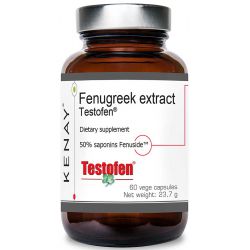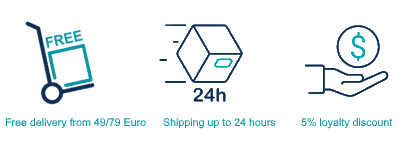
27,13 €
Science-based food supplements
Quantity:
Total:
Total products:
Total shipping: To be determined
Total:
Manufacturer: Kenay GmbH
In stock
| Quantity | Price | You Save |
|---|---|---|
| 2 | 22,32 € | Up to 1,86 € |
| 4 | 21,86 € | Up to 5,58 € |
By buying this product you can collect up to 23 loyalty points. Your cart will total 23 points that can be converted during next order into a voucher of 1,15 €.

Hesperidin Cardiose
60 capsules
Item Catalog Number: K0260EN
Original product name: Hesperidin Cardiose
Citrus fruits, such as oranges and grapefruits, are particularly rich in flavonoids. Hesperidin derived from oranges, constitutes 90% of all flavonoids contained therein. Our supplement contains Cardiose, which is a natural orange extract which, thanks to a unique production process, retains most of the natural isomeric form of hesperidin.
Cardiose is patented ingredient from citrus with benefits for heart health and sports performance. It also maintains arterial flexibility and minimized cardiovascular risk factors and improves physical performance and extends endurance. Three proprietary clinical studies have been conducted on Cardiose. Furthermore, Cardiose was found to be safe.[6]
Benefits at a Glance:
Hesperidin may help to modulate several cardiovascular diseases (CVS) risk factors. Animal and in vitro studies demonstrate beneficial effects of hesperidin on cardiovascular diseases risk factors.[2] Hesperidin has also shown glucose-lowering and anti-inflammatory properties. It may also prevent dyslipidemia, atherosclerosis, and obesity effects in CVDs and obese people. Hesperodin shows also antihypertensive and antioxidant effects.[2]
Huge number of animal studies on hesperidin shown its beneficial effects on high blood pressure [7,8,9,10,11]. The antihypertensive effect of hesperidin was suggested to be mediated by the vascular nitric oxide (NO) synthase pathway. Similar effects were reported by other scientists[13] observing an increase in NO production in hesperetin-treated human endothelial cells.[12]
Hesperidin, through its strong antioxidant effect, by increasing the bioavailability of nitric oxide, protects the endothelium against the harmful effects of free radicals.[8,14,15]
By suppressing of NADPH oxidase (which results in enhanced NO bioavailability [10,16,17]), hesperidin reduced mentioned earlier oxidative stress observed at hypertension as a consequence of an overexpression of NADPH oxidase. Hesperidin also shows anti-inflammatory activity.[18]
Hesperidin supports proper venous circulation, seals blood vessels and improves their elasticity. Hesperidin may also be helpful in supporting the treatment of hemorrhoids[24] and varicose veins.
One study demonstrated the effectiveness of hesperidin in relaxing blood vessels.[21,22]
In combination with diosmin and the use of pressure dressings and other recommendations of the attending physician, it may be an effective addition to the therapy for leg ulcers.
For physically active people who like to exercise, hesperidin by improving endothelial function, may improve skeletal muscle perfusion and increasing oxygen efflux to the muscle, which is associated with increased endurance performance. Hesperidin may also enhances muscle function by decrease oxidative stress mediated damage in muscle cells. Finally, hesperidin can decrease post-exercise-induced inflammation, which potentially speeds up the recovery process and can thereby improve exercise performance.[19,20]
Daily dose: 2 capsules
| Amount Per Day (2 capsules) | |
|---|---|
|
Rutin [hesperidin (7-rutoside)] from orange peel extract (citrus sinensis) /Cardiose/ |
500 mg |
|
Ingredients: rutin [hesperidin (7-rutoside)] from orange peel extract (citrus sinensis); capsule: hydroxypropylmethylcellulose. |
|
Cardiose is a trademark of INTERQUIM S.A. d.b.a. Ferrer Health Tech
Dosage and Use
Take one (1) capsule 2 times daily or as recommended by a healthcare practitioner.
Storage: Store in a closed container at room temperature, out of the reach of small children.
Warnings:
Hesperidin can slow the coagulation of blood in patients with bleeding disorders and increase the risk of bleeding. Hesperidin may also reduce already low blood pressure. Avoid taking hesperidin for at least 2 weeks before the surgery is scheduled.
Before you start using any dietary supplement, consult your doctor.
Dietary supplements are not medicines.
Do not exceed the recommended daily dose.
Dietary supplements cannot be used as a substitute for a varied diet.
Do not use in case of hypersensitivity to any ingredient of the preparation.
The product should not be used by pregnant or breastfeeding women and children and adolescents under 18 years of age.